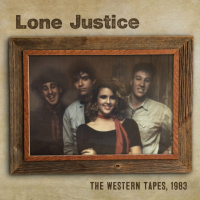Home » Jazz Articles » Multiple Reviews » Lone Justice: Newfound Ways To Be Wicked
Lone Justice: Newfound Ways To Be Wicked
 Lone Justice
Lone Justice Live At The Palomino 1983
Omnivore Recordings
2019
Parlaying as much flair as flourish right from very the get-go, on "You Are The Light" Lone Justice simultaneously invoke the muse and offer homage to the fundamental inspiration for their musical fusion. Injecting a palpable sense of irreverence into songs like "Drugstore Cowboy," the band avoids the sanctimonious solemnity of peers and successors. Likewise, it's impossible to doubt vocalist/composer Maria McKee's heartfelt connection to Patsy Cline and Emmylou Harris on "Dustbowl Depression time," to name just one cut here. Meantime, the band churns up a storm behind her, their collective precision a reflection her phrasing as well as the group's own overall self-awareness. And the all-around exultation in the playing and singing in "This World Is Not My Home ("I'm Just Passin' Through)" hardly belies the pronounced fatalism in "I See It:" the recognition of a pending apocalypse proffers an attitude of a piece with the punk rock nihilism of the times.
 Lone Justice
Lone Justice The Western Tapes 1983
Omnivore Recordings
2018
Its title something of a misnomer—this is not a handful of country covers—The Western Tapes 1983 collates a handful of early Lone Justice originals in a colorfully-designed and detailed tri-fold package (with liner notes by producer/band member Marvin Etzioni) that enhances the collectible quotient of the content itself: an earlier demo of "Drugstore Cowboy" has appeared on various compilations, but the remainder of the half-dozen tracks are previously-unreleased. And both the vivacious "Working Late" and a mournful "Don't Toss Us Away," are superior to subsequent studio versions that lack the authenticity and restrained taste supplied by Bob Dylan's Rolling Thunder band wunderkind David Mansfield via pedal steel ("How Lonesome Life Has Been") and fiddle ("The Train"). Originally released as a Record Store Day item, and issued in conjunction with the band itself, the CD EP, like its vinyl counterpart, was mastered to impressive effect by Bernie Groundman, forging a sonic clarity in line with the pioneering stylistic vision of Lone Justice.
Tracks and Personnel
Live At The Palomino 1983
Tracks: You Are The Light; Drugstore Cowboy; How Lonesome Life Has Been; The Train; Dustbowl Depression Time; Cotton Belt; This World Is Not My Home (I'm Just A Passin' Through); I See It; Working Man's Blues; The Grapes Of Wrath; Working Late ; Jackson.
Personnel: Maria McKee: electric guitar, vocals; Ryan Hedgecock: lead guitar, vocals; Marvin Etzioni: bass, vocals; Don Willens: drums
The Western Tapes 1983
Tracks: Working Late; Don't Toss Us Away; I See It; The Train; Drugstore Cowboy; How Lonesome Life Has Been Personnel: Maria McKee: rhythm guitar, vocals; Ryan Hedgecock: lead guitar, vocals; David Mansfield: pedal steel, fiddle; Dave Harrington: bass; Don Willens: drums.
< Previous
Jazz Fest: The New Orleans Jazz & Her...
Next >
Rise
Comments
Tags
For the Love of Jazz
 All About Jazz has been a pillar of jazz since 1995, championing it as an art form and, more importantly, supporting the musicians who create it. Our enduring commitment has made "AAJ" one of the most culturally important websites of its kind, read by hundreds of thousands of fans, musicians and industry figures every month.
All About Jazz has been a pillar of jazz since 1995, championing it as an art form and, more importantly, supporting the musicians who create it. Our enduring commitment has made "AAJ" one of the most culturally important websites of its kind, read by hundreds of thousands of fans, musicians and industry figures every month.


















